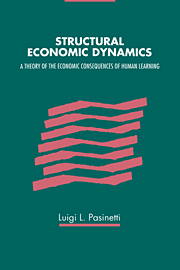Book contents
- Frontmatter
- Contents
- Preface
- Acknowledgements
- List of symbols
- I Economic theory and the neglect of structural change
- II A pure labour production economy
- III Proportional dynamics
- IV Structural dynamics
- V The evolving structure and level of prices
- VI Consumption, savings, rate of interest and inter-temporal distribution of income
- VII On the evolving structure of long-term development
- VIII From the ‘actual’ towards the ‘natural’ economic system – the rôle of institutions
- IX Boundedness of economic systems, and international economic relations
- References
- Index
VI - Consumption, savings, rate of interest and inter-temporal distribution of income
Published online by Cambridge University Press: 17 September 2009
- Frontmatter
- Contents
- Preface
- Acknowledgements
- List of symbols
- I Economic theory and the neglect of structural change
- II A pure labour production economy
- III Proportional dynamics
- IV Structural dynamics
- V The evolving structure and level of prices
- VI Consumption, savings, rate of interest and inter-temporal distribution of income
- VII On the evolving structure of long-term development
- VIII From the ‘actual’ towards the ‘natural’ economic system – the rôle of institutions
- IX Boundedness of economic systems, and international economic relations
- References
- Index
Summary
Impossibility of transferring consumption over time for the economic system as a whole
In a pure labour economy there can be no savings for the economic system as a whole. If by savings we define, following Keynes, the difference between total national income and overall consumption, there clearly is no place for overall savings in a pure labour economy. Since ex-hypothesi there are no capital goods, the entire productive capacity is available for the production of consumption goods only.
But the macro-economic equilibrium condition for effective demand, since its first formulation (II.2.5), has been telling us something else, which is less evident but even more important. The productive capacity, within each production period, must, in its entirety, be devoted to the production of consumption goods. If overall demand (and consequently overall production) of consumption goods turned out to be less than total potential national income, the difference would represent, for the community as a whole, non-realized and therefore lost consumption; i.e. it would represent consumption goods that could be, but are not, produced, and are therefore lost, because of non-utilization of productive capacity. This is one of the most characteristic aspects of production economies. To have brought it into relief appears, from the present theoretical scheme, as one of the most important contributions of Keynes' General Theory (1936).
- Type
- Chapter
- Information
- Structural Economic Dynamics , pp. 82 - 104Publisher: Cambridge University PressPrint publication year: 1993



